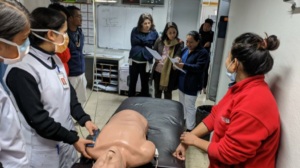Improving Emergency Medical Care in Nepal and Globally
-
Focus Areas
Capacity Building & Leadership, Health Care & Population Health -
Issues
Population Health -
Expertise
Coalition & Network Building, Technical Assistance

From 2019-2021, PHI’s Sustaining Technical and Analytic Resources (STAR) program helped create and sustain respectful, mutually beneficial partnerships to strengthen global health practice. Their Collaboration Laboratory (CoLab) recruited pairs of academic institutions to develop, test, and codify best practices for successful, sustainable partnerships. More than 100 global academic institutions applied for the program, and in September 2019, four institutional pairs were chosen. Each pair joined together in STAR-facilitated learning exchanges, received STAR technical support, and won a $15,000 STAR grant for their projects aimed at designing a joint curriculum, solving a problem, or generating new knowledge in global health.
One partnership was between the Kathmandu University, School of Emergency Medicine in Nepal (KUSMS) and the Medical College of Wisconsin (MCW) in the U.S. According to the KUSMS partners, the delivery of emergency department (ED) care in Nepal lagged decades behind that of more developed countries. Dhulikhel Hospital, the KUSMS-affiliated facility, serves 2.7 million people from the surrounding areas. In rural Nepal, there is only one doctor for every 150,000 people (compared with one for every 850 in the capital, Kathmandu). In their under-resourced and under-staffed hospitals, Nepalese ED physicians struggle to deliver standard, evidence-based care and implement standard protocols.
Through the collaboration with MCW, KUSMS improved the quality of emergency medical care and patient safety by developing feasible, evidence-based protocols that account for the resource, staffing and other constraints physicians face in the Dhulikhel ED. With learning support from the STAR program, the KUSMS/MCW partners designed a process to assess such factors as the burden of disease, its complexity, mortality rate, and feasibility. Focus-group interviews with health care workers in the ED helped the team understand their views and the barriers to using protocol-based treatments.
 The team developed an innovative training approach with the participation of all of the ED health care providers (physicians, interns, nurses and paramedics) at the hospital in Nepal. The method calls for providers to practice the contextualized protocols in simulated patient interactions in the ED. This “learning while doing” approach using treatment simulations in the actual workplace increased the providers’ knowledge, skills, and behaviors to help them reach higher-level learning and facilitate implementation of the protocols. Additionally, since the simulations occurred in the actual workplace and used available resources, such as space and equipment, they were cost-efficient and practical.
The team developed an innovative training approach with the participation of all of the ED health care providers (physicians, interns, nurses and paramedics) at the hospital in Nepal. The method calls for providers to practice the contextualized protocols in simulated patient interactions in the ED. This “learning while doing” approach using treatment simulations in the actual workplace increased the providers’ knowledge, skills, and behaviors to help them reach higher-level learning and facilitate implementation of the protocols. Additionally, since the simulations occurred in the actual workplace and used available resources, such as space and equipment, they were cost-efficient and practical.
The STAR CoLab partners aimed for their team-based approach of learning and model of protocol development and implementation to improve quality care for ED patients in Nepal’s Dhulikhel Hospital. Expanding their impact beyond the work in Nepal, they hoped to create a model for health care protocol development and implementation that could be used in resource-limited settings around the world.
In addition, the STAR CoLab partners, during the global COVID-19 pandemic, developed protocols to address COVID for ED physicians for Nepal. The article titled ‘COVID-19 Emergency Department Protocols for Nepal’ was published in the open access, online medical journal site, Dove Medical Press.
Learn more about the project on the STAR program website.
Work With Us
You change the world. We do the rest. Explore fiscal sponsorship at PHI.
Support Us
Together, we can accelerate our response to public health’s most critical issues.
Find Employment
Begin your career at the Public Health Institute.
